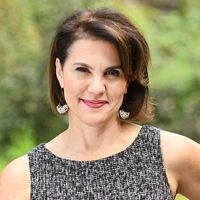I'm curious about everything. Why grass is green. Why we push the clocks forward for Daylight Saving. How to make a mean fettucine alfredo.
I want to hike the Camino de Santiago, and read Homer in Latin, and study the history of the Napoleonic Wars. I constantly need to know why. And who. And what. And how. I hate magic tricks; I get obsessed with how they pulled the rabbit out of the hat, and where the rabbit came from, and where, for that matter, they bought the hat.
My insatiable curiosity is usually a good thing, though not always. We all know what curiosity did to Eve, who misguidedly plucked from the tree of good and evil; and Pandora, who opened that box despite being told not to, thus unleashing chaos into the world.
In my own life, curiosity's seductive lure has sometimes led me to do things that are not in my best interest. Every time we follow an ex-lover on social media, that's our curiosity in action. Is that always the best use of our time? Invariably not. Still, we do it. Our curiosity gets the better of us.
When I meet someone new, I usually barrage them with questions. I'm not trying to be rude. I simply want to know where they grew up, and if they like Barry Manilow or Taylor Swift, and what they wanted to be when they grew up, and if they prefer Coke or Pepsi. From what I've been told, the inquisition can be about as pleasant as a root canal. But I mean no harm. I just want to know what makes them tick.
Bad decisions aside, for the most part my intellectual curiosity has only enhanced my life. Researchers call this "intrinsic motivation" – learning for learning's sake – as opposed to "extrinsic motivation," which involve an external incentive, like money, or a sugary confection, or an expensive gift.
My curiosity and desire to check out new worlds is the reason I learned to play the cello at 35 and got a Master's in International Relations at 42. I didn't need to do either of these things: I just wanted to pick up new skills.
Curiosity is probably the biggest reason I became a journalist because it gave me the chance to explore people and cultures that are radically different from my own. I think of that other AE, Albert Einstein, who noted that he didn't have any special talents, he was just "passionately curious." His curiosity served him well. Without it, we might never have known that E=MC2, whatever that means. (Yet another thing I'm curious about).
THE PERKS OF INTELLECTUAL CURIOSITY
Intellectual curiosity – that is, your desire to dig deeper into new subjects and ideas – is important for a variety of reasons, not least of which is that the more curious we are, the more creative we become. And once that happens, the possibilities are endless. Think about it. If people hadn't been curious, hadn't wanted to push boundaries and create something new, we wouldn't have Twitter, the Muppets or Botox. Someone, somewhere, was curious enough to see what would happen if they injected botulism into wrinkles. That curiosity has saved many an ego from falling into despair, in addition to making some people very, very wealthy.
But curiosity doesn't just have financial and cosmetic benefits. A 2014 study in the journal Neuron found that not only does curiosity helps us learn about a subject, but it also helps the brain memorize information unrelated to that topic.
"Curiosity may put the brain in a state that allows it to learn and retain any kind of information, like a vortex that sucks in what you are motivated to learn, and also everything around it," said lead author Matthias Gruber, a postdoctoral researcher at the University of California, Davis's Center for Neuroscience.
Curiosity opens us to new experiences. It makes us better (except when, say, following former partners' social media accounts.). Curiosity helps us think differently. It motivates us to push ourselves. Who knows where our curiosity might take us? Sir Edmund Hillary climbed mountains because he was curious. Ditto for Italian explorer Amerigo Vespucci. Why else would he have set sail for the New World, if he didn't wonder what was out there?
As researchers Celeste Kidd and Benjamin Y. Hayden wrote in a 2015 study, curiosity "is a motivator for learning, influential in decision-making, and crucial for healthy development."
Interested in learning more? Check out You Are What You Think
HOW TO DEVELOP INTELLECTUAL CURIOSITY
Most people are curious, even if they don't think they are. As Kidd and Hayden point out, consider how much time we spend "seeking and consuming information, whether listening to the news or music, browsing the internet, reading books or magazines, watching TV, movies, and sports, or otherwise engaging in activities not directly related to eating, reproduction, and basic survival."
Every time you find yourself in a virtual rabbit hole, clicking on link after link until you're five pages away from your original destination? That's curiosity.
There are a million ways to develop your intellectual curiosity. By reading a book. Hitting the road. Studying Sanskrit. Learning about Renaissance art. Picking up jiu jitsu. Taking a drawing class. And asking questions, lots of questions.
Or you can sign up for a course, like the ones offered by DailyOM, a gathering spot for curious minds. It's a place to come to satiate your curiosity about all sort of things. It's a destination for courses to help you continue to grow, explore, contemplate, learn, and find new ways of seeing or thinking about things. Whether you're curious about what dreams really mean, Rumi's contemplations on love, or exploring Eastern philosophies, there's a way to scratch every intellectual itch.
Indeed, curiosity didn't kill the cat. It just made her more interesting.

